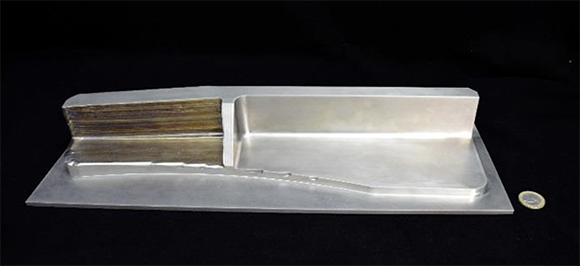Prodways Group presents Rapid Additive Forging technology for the manufacture of large parts
June 17, 2017

©Prodways – example of 3D printed and partially finish-machined titanium part
Prodways Group, Les Mureaux, France, a subsidiary of Groupe Gorgé, has announced its development of Rapid Additive Forging (RAF) technology for the Additive Manufacturing of large titanium parts.
Large metal parts for critical applications, in particular titanium parts for the aeronautical sector, rely on expensive and slow manufacturing processes often using combinations of forging and machining techniques. Certain titanium parts have manufacturing lead times of more than twelve months and are associated with significant amounts of material waste.
Prodways Group states that its Rapid Additive Forging technology has been built on the back of intensive R&D efforts and a strengthening of its AM offering. The machine that has been developed uses a robot equipped with a head depositing molten metal in an atmosphere of inert gas. Accordingly, the metal is deposited layer-by-layer and large parts are completed within a few hours.
This innovative technology, states the company, quickly manufactures titanium blanks with very close geometries to the final part. These blanks are then finish-machined, thus avoiding considerable losses of material which can represent up to 95% of a metal block with traditional machining processes.
The technology was developed in collaboration with Commercy Robotique, a subsidiary of Groupe Gorgé that has specialised in robotised welding for more than 40 years. A patent application has been filed by Prodways Group. The process has been tested on various metals, however there is a strong focus on titanium, a metal seeing increased use in new-generation aircraft.
The company states that the third generation of the prototype can produce parts of more than 70 cm in length, however a version is being developed that will be able to manufacture parts of up to 2 m in the main dimension.
It was stated that Rapid Additive Forging has been developed with a focus on metallurgical quality and the repeatability of the process. The first metallurgical tests conducted on parts has revealed an absence of porosity and greater mechanical resistance compared with metal AM processes using laser or electron beams.
Prodways stated that several players in the aeronautical industry believe this technology family could be applied to nearly 50% of the titanium parts used to manufacture an aircraft and generate savings of up to 50% on the cost of parts.
















